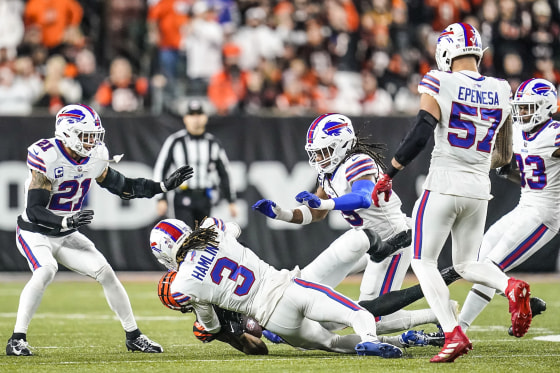Among the barrage of misinformation that circulated during the pandemic was a baseless idea that young athletes who had recently been vaccinated were dropping dead from heart issues as a result. The claim has been repeatedly debunked as details about individual cases were revealed, and scientific research has found no link between Covid vaccines and cardiac arrest, a condition in which the heart suddenly stops.
A six-year study published Monday puts any lingering skepticism to rest.
The study, in the journal JAMA Network Open, compared episodes of sudden cardiac arrest and cardiac deaths among young, competitive athletes before the pandemic — from 2017 to 2019 — with those from 2020 to 2022. The numbers were relatively similar, the results showed: 203 cardiac arrests or deaths occurred before the pandemic, followed by 184 during.
The dataset included athletes ages 10 to 34, identified through a surveillance program led by the National Center for Catastrophic Sports Injury Research.
The study’s author, Dr. Jonathan Drezner, said the findings invalidate erroneous claims made on social media during the pandemic.
“I think the results speak for themselves. There was really no change in the overall frequency of sudden cardiac arrest and death in young athletes across the U.S.,” said Drezner, director of the Center for Sports Cardiology at the University of Washington.
Dr. Aaron Baggish, a cardiologist at the Massachusetts General Hospital Heart Center, who was not involved in the study, said the new research should “make it clear to everyone, even naysayers, that Covid was not a particularly difficult virus for young, healthy people, and that the vaccine did much more good than harm.”
A key piece of fuel for those against vaccines was a widely circulated video compilation in 2021 that showed news reports of athletes collapsing, set to ominous music. The video was posted on the website of “The HighWire,” an internet talk show founded by anti-vaccine activist Del Bigtree. Bigtree served as the communications director for Robert F. Kennedy Jr.’s presidential campaign last year. Kennedy is now the secretary of health and human services and responsible for overseeing federal policy on vaccines and infectious disease research.
Conspiracy theories about Covid vaccines’ effects on athletes reignited in 2023, when the Buffalo Bills' Damar Hamlin suffered a cardiac arrest during a game. Social media posts attributing his medical emergency to Covid vaccines amassed millions of views. Afterward, then-Fox News host Tucker Carlson claimed that two researchers had detected a rise in cardiac arrests in European sports leagues after the Covid vaccines became available. But the research in question turned out to be a letter to the editor citing junk science.
About six months after Hamlin’s episode, Bronny James, basketball star LeBron James’ son, suffered a cardiac arrest during basketball practice at the University of Southern California. At the time, Florida Surgeon General Joseph Ladapo suggested, without evidence, that the incident was linked to USC players being “forced or misled into taking a vaccine ... proven to cause cardiac injury.”
Several studies prior to Drezner’s have shown that Covid vaccines aren’t linked to deadly heart problems. The Centers for Disease Control and Prevention last year analyzed nearly 1,300 death certificates among people ages 16 to 30 on which the listed causes were heart issues or unknown, and found that no deaths could be definitively attributed to heart problems within 100 days of getting a Covid shot. A 2023 study also found no link between Covid vaccines and sudden cardiac arrest in athletes.
Covid vaccines do come with a very small risk of myocarditis — inflammation of the heart muscle — but the risk is much higher after an infection with the virus itself. When the heart muscle is inflamed, it can cause an irregular heartbeat, which can lead to cardiac arrest. In Drezner’s study, myocarditis was responsible for three cases of sudden cardiac death before the pandemic and four cases during.
In the early days of the pandemic, some doctors worried that a Covid infection might bring an outsized risk of myocarditis compared to other respiratory viruses, and that high-intensity exercise could make athletes particularly vulnerable. But in the end, Drezner said, researchers found that the risk was similar to that of other viruses.
On rare occasions, high-intensity workouts may put enough stress on the heart to trigger cardiac arrest, regardless of one’s Covid history. However, most cases of cardiac arrest in young people are linked to an underlying heart problem such as a genetic disease or a defect that has been present since birth.
For about 30% of the young athletes in Drezner’s study who experienced cardiac arrest, the event did not even occur when they were exercising. That’s not surprising, according to Dr. Neel Chokshi, medical director of Penn Medicine’s Sports Cardiology and Fitness Program, who wasn’t involved in the study.
“We’ve noticed that oftentimes ... it’s not during actual exercise or strenuous activity, but it can happen at any time,” he said.
One limitation of the new study, Chokshi said, is that there’s no mandatory reporting of cardiac arrests in athletes, so the researchers relied on reports from new outlets, social media, schools and programs that collect such data. That means some cases could be missed, he said, though it shouldn’t affect the comparison between pandemic and pre-pandemic years, since cases could be missing from both periods.
“If there were a lot of adverse events or negative effects from Covid or the vaccines, we should see a spike,” he said. “There’s just no evidence of that.”
Today, doctors recommend that athletes who have Covid avoid exercise until their symptoms clear up, then gradually ease back into physical activity. Whereas competitive athletes used to wait up to six months to resume sports if they developed myocarditis, doctors changed the guidelines last week to allow them to return to competition months sooner if their symptoms and inflammation resolve.

